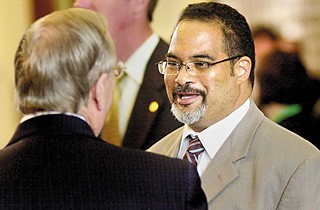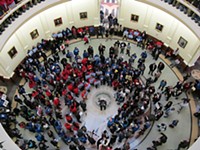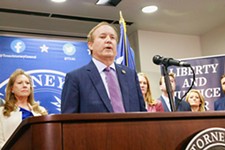Behold the Texas Miracle!
Texas and Austin are prosperous, yes ... but it's been an unequal bounty
By Michael King, Fri., March 20, 2015
By now most Austinites – perhaps even most SXSW visitors flooding Downtown this week – are familiar with the political rhetoric of the "Texas Miracle." Coined by state business boosters to describe the relatively booming state economy of the last decade, the term was popularized on the stump in former Gov. Rick Perry's ill-fated 2012 presidential campaign, where its arithmetic was simple: limited government + low taxes + light regulation = booming economy. (Occasionally, depending on the audience, the left side of the equation might also include "tort reform" and "family values.")
Having grown a little wary of the term, Perry himself has recently taken to referring instead to the "Texas Model," elaborating, "I can't explain a miracle, but I can explain this. This is a Texas model." He's right to be cautious; the phrase actually precedes its economic application, having been the bumper sticker for George W. Bush's first run for president. Then, the "Texas Miracle" was the alleged spike in state student accomplishment due to the imposition of public school "accountability" measures and high-stakes, standardized testing inaugurated in the early Nineties, just before Bush became governor, and then steadily expanded nationally via "No Child Left Behind."
But with time, and upon closer inspection, the sparkling achievement numbers evaporated. More importantly, as the testing regimes became more intensive and intrusive, and the consequences of "accountability" more dire – students, parents, and teachers began to rebel. Recounting the backlash in Texas Monthly ("Crash Test," May 2013), Nate Blakeslee wrote, "Nobody is talking about miracles anymore."
Could the same cycle apply to the "economic miracle"? Perry's 2012 campaign stumbles didn't help the state's reputation, but as political themes go, highlighting a growing economy is unlikely to go out of style anytime soon. Perry's successor, Gov. Greg Abbott, knows the drill. In Forbes last week under the headline "Texas Means Business," he wrote, "We have built a framework that allows free enterprise to flourish, including less government, low taxes, reasonable regulations, and the right-to-work laws that attract job creators and keep job growth here in the state of Texas. As governor, I intend to do more to build an even stronger business environment." There's the formula, plus "right-to-work" ("for less," the unions like to add), currently high on the GOP pop-charts. And Abbott (or his ghostwriter) has gotten the memo about the "model": "Texas is the top state for capital investments, for job creation, for exports, for energy production and more. The Texas model is proof that limited government encourages unlimited opportunity for all. By limiting the size and scope of government, controlling spending, reducing debt and removing barriers to business growth, we unleash job creation and innovation."
Miracle or Myth?
Although the overall national economy has steadily improved since the Great Recession, the argument persists over whether Texas has been ahead of other states or more simply benefiting from its longtime economic base of hydrocarbons. The battle was renewed last year by The Washington Monthly's Phillip Longman ("Oops: The Texas Miracle That Isn't," March 1, 2014), who argued at length that the state's claim to economic exceptionalism is largely illusory or built on sand, particularly oil sands. Longman didn't dismiss the progress out of hand, but said that much of the boosterism is either illusory or overrated, at least concerning domestic migration from other states ("comparatively low"), lower taxes (only on the wealthy), lower business taxes (not for small businesses), upward mobility (meager), and per capita income (stagnant).
Longman credits Texas' relative recent prosperity, first, to population growth – "immigration from abroad, mostly Mexico, and a birthrate that is the second highest in the nation after Utah" – and secondly, to "huge new flows of oil and gas dollars, plus increased trade with Mexico."
"But," he concludes, "this model of economic development, which also combines a highly regressive tax system with minimal levels of public investment, has not allowed Texas to keep up with America's best-performing states in per capita income or rates of upward mobility."
The opposite case was made by Erica Grieder in her book, Big, Hot, Cheap, and Right, in which she argues that the Texas Model has indeed yielded dramatic results, and the secret sauce isn't hydrocarbons. She summarized that argument earlier this month in National Review: "Since the 2000 census, the state has added about 5 million people, bringing its total population to about 27 million. Between 2004 and 2014, it added some 2 million new jobs – about 30 percent of all the net new jobs in the country. The unemployment rate has been lower than the national average every month for more than eight years. Such statistics exist in apparently endless profusion, and critics of the state's lean-government model, or of Texas more generally, have been repeatedly frustrated in their attempts to poke holes in the story. Suspicions that the new jobs were disproportionately minimum-wage McJobs,' for example, have been scuttled by analysis from the Dallas Fed, which found that, between 2000 and 2013, Texas created jobs in every income quartile at a greater rate than the nation as a whole."
Reviewing Grieder's book last year, the Texas Observer's Forrest Wilder acknowledged that the Texas Model – even granting the advantages of explosive immigration, the fracking boom, and (for a while, anyway) plenty of cheap housing – must receive some credit for that remarkable job growth. The very single-mindedness of the state's (virtually indistinguishable) political and economic structures has lent itself to "job creation" (the conventional euphemism for investment capital) above all other public values. "It's plausible," writes Wilder, "that by doing everything you possibly can to make life easy for big business – taxpayer-supported incentive packages, zero corporate and income tax, a captive regulatory system, weak labor unions, a political system up for sale to the highest bidder – that one state can out-compete others.
"But a national economic policy this is not. It's also not a sustainable model for long-term success."
The Texas Challenges
The deeper and more persistent questions about the Texas Miracle have to do not simply with gross economic statistics, but with equity and quality of life for all Texans, not just the folks riding high on the boom. The disparity among beneficiaries was recently brought home to Austin in a report ("Segregated City") issued by the University of Toronto, which found the Austin-Round Rock metro area to be the most "economically segregated" metro in the U.S. (See "Point Austin: Desegregating Austin," Feb. 27). Texas is hardly alone, of course; the inequality that has steadily grown since the Seventies, exacerbated by the latest recession, is a national phenomenon that might in fact be somewhat blunted here by job growth.
"We have many good things happening in this state, and thank goodness they are happening," Ann Beeson said last week. "Yes we have a lot of jobs, yes we have a thriving economy, yes we have a lot of wealth." Beeson is executive director of the Center for Public Policy Priorities, the Austin think tank dedicated to advocating for mid- and lower-income Texans. "And yes, all these good things, to one degree or another, contrast with some of our neighboring states. But I would say, that's where the 'miracle' ends. There are so many challenges remaining, I think we are very far from a Texas miracle that would benefit everyone in the state."
Beeson called attention to some of the statistical categories gathered together on these pages, as illustrations of the kind of challenges faced by many poor and working Texans. (Year in and year out, CPPP diligently compiles many of these statistics, issues policy papers describing their causes and effects, and stoically lobbies the Legislature in support of legislation that would ameliorate the worst consequences.) "Texans have one of the highest rates of poverty in the country," Beeson noted. "We rank 38th in terms of poverty. Again, there are lots of poor states; there are not a lot of states with high poverty rates that also have high wealth.
"That's the disconnect. One in four Texas children lives in poverty, and there are a lot of related statistics. We're tied, for example, in having the highest number of adults that lack a high school degree. ... We have growing income inequality, and that's particularly interesting in terms of the Texas Miracle. Because during the recession, Texas basically turned a large number of middle-wage earners into low-wage earners.
"Prior to the recession, there were a certain number of Texans who were middle-wage earners, and that number changed by a huge percentage, in the course of that period, from pre- to post-recession. At the same time, low-wage jobs skyrocketed. So when we talk about the growth of jobs in Texas – which is a good thing; no one would say it's a bad thing – the problem is, they don't pay enough for a family to get by; in fact they don't come close to paying enough for a family to get by."
One striking pair of statistics illustrates that disconnect (from the "Texas Kids Count" research: www.cppp.org/kidscount). The unemployment rate of parents in 2013 (the most recent numbers available) would seem to be something to celebrate: only 5% (down from 6% in 2009), representing about 251,000 people. Yet the rate of children living in poverty was 25%, or an estimated 1.7 million Texas children (1.9 million in "food-insecure" households). There might be more than one reason for that disparity, but the most important one is that the jobs held by those parents simply don't pay enough to support their families, or to lift them above the hardly adequate federal poverty line. When all policymakers can see is "jobs, jobs, jobs," – without regard to whether those jobs are sufficient for a quality of life, or even sustenance – it's much easier to call the numbers miraculous.
According to Beeson's research, "Sixty percent of the jobs that were lost during the recession were middle-range occupations, that paid between $14 and $21 per hour. Fifty-eight percent of the new jobs created in Texas*[see correction below] since the recession are low-wage jobs that just pay between $7 and $13 per hour. So it's pretty stark."
Other direct consequences of the Texas "low-tax, low-service" Model are better known. In 2013, the percentage of Texans without health insurance was a whopping, nation-leading 25%. (Thanks primarily to the federal Children's Health Insurance Program, only 13% of Texas children were uninsured.) That number has diminished somewhat with the arrival, last year, of the Affordable Care Act – a law that the state leadership is doing everything in its power to overturn.
Beeson and CPPP are not content to collect and recite the statistics and hope that somebody notices. "The question," she continued, "is what would it take to create a real Texas miracle. I firmly believe, because I'm an optimist at heart, that there is absolutely a clear path to getting there. It would be, first of all, in shrinking the economic inequality gap, and shrinking the number of kids and adults living in poverty. To do that, you have to invest in programs that have been proven to expand opportunity. Those start at the very low end, including expanding access to pre-K[indergarten] ... and making it more affordable for kids to go to college; raising the minimum wage.
"And then the final issue I'll mention, which is absolutely critical because it's such a huge amount of money ... The single thing that Texas could do to make a quick dent in the poverty rate, and expand opportunity, would be to come up with a Texas solution to the coverage issue. We should accept the federal dollars to expand Medicaid."
Beeson acknowledges that beyond pre-K, the short-term prospects for dramatic policy changes are slight. She says that on education issues, there is broad consensus (including among business groups) that more investment needs to be made (a recent bit of evidence is a letter sent to the Capitol by six major business organizations saying that such investment is a higher priority than tax cuts). "We are lucky," said Beeson, "in that we have the money to do this. It's just a question of whether we want to spend a lot of money on tax cuts for the wealthy, or invest in infrastructure, and education, and health care in a way that benefits everybody in the longer term."
Prisoners of Belief
On the House end of the Capitol, Rep. Garnet Coleman, D-Houston, has been pounding away on these issues, especially health care, for many years, with steady but seldom dramatic success (getting CHIP expanded in Texas was a major victory for children). He heads a House caucus, the Legislative Study Group, which over the last decade has released a biennial report called "Texas on the Brink," a broad collection of statistics ranking Texas on a variety of economic and social standards. (A similar report was once officially compiled by the comptroller's office and called "Texas: Where We Stand," but the results generated so much embarrassment that it was quietly abandoned. Most of the statistical rankings appearing with this story are selected from the 2013 edition of "Texas on the Brink." Coleman said the update will be available in a few weeks.)
Coleman said last week, "There is a Texas miracle, but it's a miracle of oil and gas, as it always has been. We always return to the challenges when the prices of oil and gas start dropping. A lot of the 'super-miracle' right now is from the sale of gas from fracking. ... Not necessarily or only from the direct sales and hiring in the industry, but that has also meant an increase in hiring of everyone around that industry – including fast-food workers, for whom it's not enough of an income for an individual who happens to be in that circumstance.
"It would be different if the minimum wage was higher in Texas, and that's something that we really need to do. Other states have started on that path, to make sure that if we're going to have a number of increased service jobs that don't pay well, that we increase the minimum wage so that those jobs are good jobs too."
The prospects for that kind of change, in this era of the Texas Legislature, are certainly not bright. Beeson suggested that perhaps legislators could be persuaded to remove the restrictions on local jurisdictions against raising the wage floor – "Some cities would be ready to do that," she said, "and it would help many working families."
Asked what he thought were the serious prospects of change in this session, Coleman said, "The one thing I know, is that when people have jobs that can't pay all their bills, and they have to have two and three jobs just to get by, that's a problem for many Texans. If you're going to work 40 hours or more, it would be better to do that in one place, with decent hourly pay, so that they can take care of their families. That's something that we need to do; I don't know that we will do it. But," he added with some irony, "Wal-Mart [with recent wage raises] seems to be leading the way."
Coleman noted that the persistent drop in oil and gas field prices has not yet clearly hit the labor market, and Texas is yet to see the effects when "all those jobs go away." Once that happens, he continued, "then the sectors that have been boosted by those jobs will lose jobs, and the cycle continues."
From the latest cycle of "Texas on the Brink" statistics, Coleman doesn't anticipate dramatic changes, and expects the new report will show, once again, that the circumstances of "the people in the bottom quarter" are not significantly improved. "And their prospects, and their children's prospects – will be based on how we fund public education, and access to higher education for middle-income families," and similar programs.
In a word, Coleman acknowledged that the legislative prospects for those kinds of changes are "tough."
"The conservatives at the Legislature have basically drawn a line in the sand, saying they're just not doing those kinds of investments in health care, or trying to close the gaps [in inequality] – which is foolish, either from an economic perspective, or a health care perspective. The hospitals, for example, are paying for the emergency care for people who have no other way to get health care – as are other providers."
Coleman noted the legislative forces pushing the state backward. "This is the first time in a long time – it feels a lot like 2003 – but it's in the Senate, when public policy from the right is pushing legislation that ultimately ends up being bad for many Texans. It's being pushed in the Senate, just like it was being pushed in the House in 2003. Then there was little resistance in the Senate – it remains to be seen if there will be resistance in the House. Right now, the Senate is insisting that rather than investing in the state of Texas, they want instead to return what amounts to the price of a good dinner to the taxpayers. That's what we're fighting."
Much like the myth of U.S. exceptionalism, the myth of Texas exceptionalism – so useful to politicians, pundits, and chambers of commerce – will not die easily. Perhaps the recession's hollowing-out of middle-class jobs will generate some official recognition; perhaps the oil and gas slump will begin to reverberate and raise some political eyebrows; conversely, perhaps the immigrant-fueled population growth will eventually sink into the political consciousness as a boon rather than a burden. But as Wilder wrote, "Reckless growth is not a perpetual-motion machine. Sooner or later, Texas' lack of investment in infrastructure and education, wanton disregard for climate change, staggering income inequality and regressive tax structures will put sugar in the tank of the job-creation machine."
Faith in "limited government" and "low taxes" as a panacea for every state problem effectively places the responsibility for public policy in the hands of private interests which – however successful they are at capital accumulation marketed as "job creation" – have priorities quite different from the general welfare. If Texans want to wait for that explosive prosperity at the top to eventually trickle down to the folks at the bottom, they might as well believe in miracles.
*Editor's Correction: This statistic on jobs lost during the recession was originally cited, in error, as covering Texas employment, but is instead a national figure. A similar breakdown for Texas is not currently available.
Got something to say on the subject? Send a letter to the editor.













